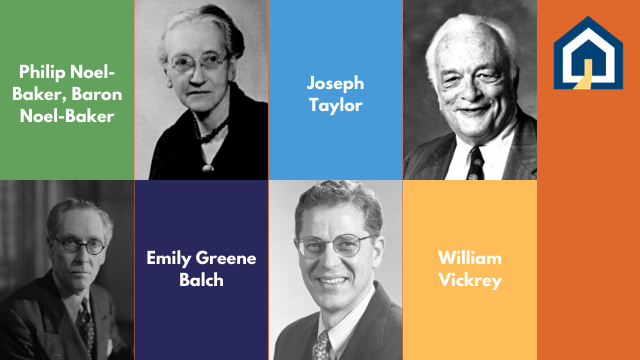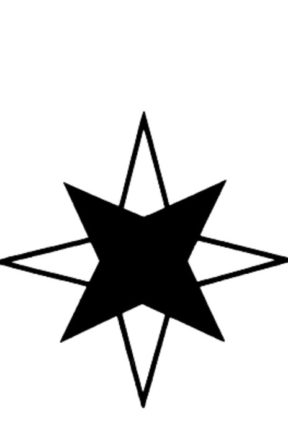
The Nobel Prize was created through under Alfred Nobel’s November 1895 will. The bulk of Nobel’s fortune endowed a novel effort to award prizes in the fields of Physics, Chemistry, Physiology or Medicine, Literature and Peace, and the inaugural award was made in 1901.
Friends throughout history have made significant contributions in the fields of science, medicine, peace, art, manufacturing and industry, and economics (to name a few). Some of these Quakers, like Henry Cadbury–who accepted the Nobel Peace Prize on behalf of Quaker relief work done through AFSC–are well known to Quakers today.
However, there are less-frequently mentioned Quakers who’ve been equally recognized as Nobel Prize winners for their work in 1946, 1959, 1993, and 1996. These four Quaker Nobel Prize recipients made their contributions through professional careers that touched on peace, disarmament, physics, and economics:
Emily Greene Balch (1867–1961), American, Nobel Peace Prize 1949
An American political scientist, Emily was born in Boston. She was one of the first graduates of Bryn Mawr College, and in 1896, she joined the faculty of Wellesley College, becoming a full professor of economics and sociology in 1913. Raised a Unitarian, Balch became a convinced Quaker in 1921.
Emily was a sociologist, political scientist, economist, pacifist, and a leader of the women’s movement for peace during and after World War I. She helped found the Women’s International League for Peace and Freedom (WILPF) in Zürich, Switzerland. She was awarded the Nobel Peace Prize in 1946, sharing that award with John Mott.
Balch’s life is an inspiring expression of the interconnections between economic justice and peace. Here are her prescient thoughts on life and our future from a Nobel Lecture she gave in 1948:
It is natural to try to understand one’s own time and to seek to analyse the forces that move it. The future will be determined in part by happenings that it is impossible to foresee; it will also be influenced by trends that are now existent and observable. We speculate as to what is in store for us. But we not only undergo events, we in part cause them or at least influence their course. We have not only to study them but to act…
We are not asked to subscribe to any utopia or to believe in a perfect world just around the comer. We are asked to be patient with necessarily slow and groping advance on the road forward, and to be ready for each step ahead as it becomes practicable. We are asked to equip ourselves with courage, hope, readiness for hard work, and to cherish large and generous ideals.
References: https://www.newworldencyclopedia.org/entry/Emily_Greene_Balch
https://www.nobelprize.org/prizes/peace/1946/balch/biographical/
http://www.irwinabrams.com/articles/balch.html
Philip Noel-Baker (1889–1982), Nobel Peace Prize 1959
Philip was born in England. He studied at Bootham School, York, before moving to the US to study at Haverford College. He also attended King’s College in Cambridge, and while there became deeply involved in The Cambridge Athletic Club. In 1920 he made it to the Summer Olympics, where he served as team captain and won a silver medal in the 1500 meter middle-distance run.
He participated in World War I as a volunteer medical orderly and conscious objector who led the Friends Ambulance Corps. From 1924-1929, Philip was a Professor of International Law at the University of London. He moved between academics, politics, and government throughout his life, working at the League of Nations in close cooperation with such Peace Prize Laureates as Fridtjof Nansen, Normann Angell, and Lord Cecil.
His struggle for multilateral nuclear disarmament led to his being awarded the Peace Prize in 1959.
In presenting the Prize, Gunner Jahn spoke of Noel-Baker’s Quaker heritage:
Throughout his life, he has been true to the high ideal of the Quakers – to help his fellowmen, without regard to race or creed; he has striven to build a world in which violence and arms are no longer necessary in the struggle for existence, either among men or among nations.
References: https://www.newworldencyclopedia.org/entry/Philip_John_Noel-Baker
http://www.quakersintheworld.org/quakers-in-action/231/Philip-Noel-Baker
https://www.nobelprize.org/prizes/peace/1959/summary/
Joseph H. Taylor Jr. (b. 1941), American, Nobel Physics Prize, 1993
An astrophysicist, Joseph was born in Philadelphia, PA, and attended Moorestown Friends School in NJ and then Haverford College. In 1968, he received a Ph.D. in astronomy at Harvard University. He took a teaching position at the University of Massachusetts, Amherst, from 1969 to 1981, later joining the faculty at Princeton University, where he became the James S. McDonnell Professor of Physics in 1986 and professor emeritus in 2006.
He was the co-recipient of the 1993 Nobel Prize for Physics with Russell A. Hulse for their joint discovery of the first binary pulsar. Their discovery of the first binary pulsar, PSR 1913 + 16, provided an unprecedented test of Albert Einstein’s theory of gravitation, which, according to the general theory of relativity, predicts that objects accelerated in a strong gravitational field will emit radiation in the form of gravitational waves.
Taylor, who is a member of Princeton Monthly Meeting, describes the influence his family’s Quaker roots and beliefs had on him in this excerpted first-person biography he authored for the Nobel community in 1993:
Both the Evans and Taylor families have deep Quaker roots going back to the days of William Penn and his Philadelphia experiment. My parents were living examples of frugal Quaker simplicity, twentieth-century style; their very lives taught lessons of tolerance for human diversity and the joys of helping and caring for others. Our house was large, open, and friendly. To my knowledge it has never been (nor indeed can be) locked.
References: https://www.nobelprize.org/prizes/physics/1993/taylor/biographical/
https://www.britannica.com/biography/Joseph-H-Taylor-Jr
William Vickrey (1914–1996), Canadian, Nobel Economics Prize, 1996
A Canadian-born American economist, William was born in Victoria, British Columbia. He attended Yale University and Columbia University. In 1948, Columbia University awarded him a Ph.D. in economics. He taught economics at Columbia University from 1946 to 1967.
He was awarded the Nobel Prize for Economics in 1996 for a novel approach to auctioneering, now known as a “Vickrey auction.” He shared the award with British economist James A. Mirrlees.
Vickrey made significant contributions in the areas of auction economics, taxation, social choice, game theory, and macroeconomics.
As a Quaker, he was a conscientious objector during World War II, during which time he helped develop a new inheritance tax for Puerto Rico. His Ph.D. dissertation His 1948 doctoral dissertation, Agenda for Progressive Taxation, became a classic and was reprinted in 1973.
References: https://www.nobelprize.org/prizes/economic-sciences/1996/vickrey/biographical/
https://www.britannica.com/biography/William-Vickrey
https://prosperitynow.org/blog/appreciation-william-vickrey
 American Friends Service Committee (Organization)
American Friends Service Committee (Organization)
In 1947, the American Friends Service Committee received the Nobel Peace Prize. The Nobel Peace Prize was awarded jointly to Friends Service Council and American Friends Service Committee.
The Committee was founded in 1917 when the United States was drawn into World War I. The American Quakers sought to demonstrate God’s love for man by doing good deeds. They appealed to the Government to be allowed to undertake humanitarian work as an alternative to war service. The Quakers set up provisional houses, provided livestock and seed corn, and were very active in their efforts to help the sick and pregnant in France. After the war, they organized aid projects in Germany and the Soviet Union, where there was great suffering from hunger and need.
References: https://www.nobelprize.org/prizes/peace/1947/summary/